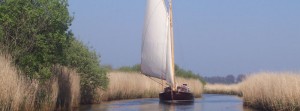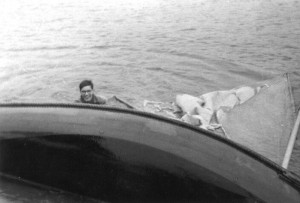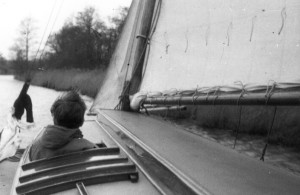The water laps gently at the sides of the boat. The sun is still feeble on this early April day in the Norfolk Broads. There is no wind, so we are propelling the boat by walking up the broad, wooden decks to the bow, plunging our pole into the shallow water and then walking back to the stern pushing the pole and thus moving the boat. We are headed up the narrow river, perhaps from Potter Heigham to Hickling Broad.
There are three boats in company. This adventure is by invitation from Mr. Brown only. There are sixteen Boy Scouts from St. Paul’s School, an assistant scoutmaster – also a boy, and Mr. Brown. Six to a boat designed for four. Four sailors get bunks and the remaining two sleep on the cabin sole between the others.
Sometimes we sail in company but often we have a great deal of freedom and go our own way, only to meet up at a designated spot for the evening. There will be dinghy races, new anchorages and evenings in the local pub drinking cider. I don’t believe that any of us were ever asked how old we were. It was still out-of-season and the authorities were a long way away. The dinghy races were hard-fought and, since we firmly believed that we could go faster if we hoisted the sail further up the mast, they often ended up in the chill water of the Broads.
Once we went hard aground few feet from the shore. I remember the bow being pointed straight for the shore. What we were thinking as we sailed at full speed into the mud I cannot now imagine. At the time it was all great fun. On that occasion we had to wait several hours for a patrol boat with an engine to come and tow us off. Our poles achieved nothing.
Every evening there would be a Mahjohng game with Mr. Brown aboard his boat. Like the trip as a whole this was by invitation and was a great honor. I still remember the sound and feel of the pieces, although I no longer have the faintest idea of the rules or the strategy.
One year I was assigned the job of quartermaster. This meant planning all the meals and making sure that we had supplies. We had a mimeographed guide, indicating what was required but I thought I’d go my own way. I enlisted Possum who told me how to make roast beef hash. This I stuffed into plastic Harrods ice cream boxes and took with us for the first meal. I also made creamed tuna served on rice with peas – still a favorite of mine. Unfortunately, I did not make sufficient allowance for six hungry boys. We ran out of food on a Sunday in a remote location. Only a long hike brought us to a store with a dusty inventory of a few cans, which supplied us with enough food to tide us over for the remainder of the trip. In spite of this mishap, my turn as quartermaster was judged a success since we had food that many of the crew had never heard of before.
It was on my last trip to the Broads that we had our most serious mishap. The boats were heavy, slow, gaff-rigged sloops with large mainsails and tiny jibs. The mast was stepped in a tabernacle on deck, and, in theory could be folded down to allow the boat to pass under low bridges. (We, of course, had been told not to try this.) It was a brisk afternoon and we were sailing downwind on the Bure towards Yarmouth, where we knew there was a low bridge. What we were going to do when we got there was discussed but not decided. There certainly was some sentiment that taking down the mast would be a fine idea. As we approached the bridge I was at the helm running on a starboard tack. I decided that I didn’t want to be the one to sail into the bridge, so I put the helm down and handed it over to another boy. The boat responded well and made a smart turn to port. Unfortunately this led to a gibe and the heavy boom took the roof off a moored houseboat as it swung. Nobody was aboard the houseboat and we left a note identifying ourselves and apologizing. I do remember some questions later on having to do with inquiries from the insurance company but there wasn’t any serious trouble.
Mr. Brown was the Scoutmaster of one of the two troops at St. Paul’s. He also coached crew and was my coach in the third eight one year. A few years ago I was sitting next to a gentleman at dinner in Boston and noticed that he was wearing an RAF tie. I asked about it and found out that he was Dutch and had left Holland when the Germans arrived and had trained for the RAF and lived in London for a time. When I told him that I’d grown up in London and gone to St. Paul’s School he asked me if I knew Peter Brown. I said no, that I didn’t think so. His response was that Peter had taught at the school and had been interested in rowing. This was the clue that brought me around: “Oh, you mean Mr. Brown. He was my rowing coach.”


